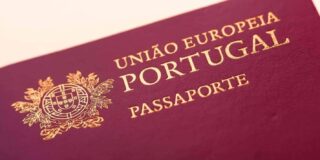Securing a work visa is a key requirement for non-EU citizens looking to build a career in Portugal. The process can seem complex, but with careful planning and a clear understanding of the regulations, it’s entirely achievable.
While there are several types of work visas, the Portugal D1 Work Visa is officially known as the Subordinate Work Visa and is designed for individuals from outside the EU/EEA/Switzerland who have secured a job offer or employment contract with a company in Portugal.
This article breaks down the Portuguese D1 Work Visa requirements, types, and application process into manageable steps, offering practical advice and essential insights for prospective international workers.
You’ll also find out more about:
- D1 Work Visa Requirements
- Portugal work permit types
- How to get a Work Visa in Portugal
- Processing Times and Costs
- Taxation and Fiscal Representation
Do I Need a Work Visa for Portugal?

Generally, you need a Portugal work visa if you are a citizen of a country outside the European Union (EU), the European Economic Area (EEA), or Switzerland. The EEA includes Iceland, Liechtenstein, and Norway.
Citizens of EU/EEA/Switzerland countries typically enjoy the freedom of movement within these regions and do not require a separate work visa to live and work in Portugal.
It’s crucial to remember that securing a job offer from a Portuguese employer is usually a prerequisite for applying for a work visa, even if you are from outside the EU.
Difference between the D1 Visa and the D8 Visa
While both are considered work visas in Portugal, they serve different purposes for non-EU citizens seeking to live and work in the country.
The Portugal D1 Work Visa, officially the Subordinate Work Visa, is specifically for individuals who have secured a formal employment contract with a Portuguese company.
This visa requires a pre-existing job offer and a signed contract. It’s designed for those entering traditional employment within Portugal, focusing on establishing a long-term working relationship with a Portuguese employer.
In contrast, the D8 visa, known as the Digital Nomad Visa, caters to individuals who work remotely for companies or clients located outside of Portugal. This visa requires proof of consistent income derived from remote work activities.
D1 Portugal Work Visa Requirements

Unlike some Portuguese work visas, the D1 Visa requires a formal employment contract with a Portuguese company before starting the application process.
Once you secure a job, your employer will begin the visa process by applying for your work permit through the Portuguese Labor Authorities (Autorização de Trabalho).
After the authorities approve your work contract, you must apply for the actual work visa at the Portuguese Embassy or Consulate in your home country to enter Portugal.
The validity of your visa depends on your nationality and the terms of your employment contract, and it requires your physical presence in Portugal.
If your employment contract lasts longer than six months, you must apply for a temporary residency permit before your visa expires to maintain your legal Portugal residency and work status. The specific type of residency permit needed will depend on the nature of your employment contract.
You must also demonstrate adequate health insurance coverage and have sufficient financial resources to support yourself during your stay. Additionally, registration with the Portuguese tax and social security authorities is required.
Regardless of the specific visa type, there are general requirements and documents needed for all Portuguese visa applications. These typically include:
- Valid passport
- Recent passport photo
- Proof of travel insurance covering medical expenses (with a minimum coverage of €30,000)
- Proof of accommodation in Portugal for the duration of your work
- Evidence of sufficient funds for self-support
- Police clearance certificate confirming the absence of a criminal record.
Portugal Work Permit Types

Portugal has several work visas that fall under the D-Visa category, but the Portugal D1 Work Visa is divided into two types. The type of work visa you will need will depend on your nationality and the length of your employment contract.
Short-term Portuguese work visas
Temporary stay visas are required for employees and self-employed workers on temporary contracts lasting less than six months pending evaluation by the labor authority (IEFP). These generally fall under the seasonal work visa.
It is possible to extend this short-term visa to up to one year if you are involved in scientific research, academic teaching, highly qualified professional activities, or specific training and service provisions offered by members of World Trade Organization countries.
If you are visiting Portugal for short-term business purposes, you can apply for a Portuguese business visa.
Long-term Portuguese work visas
For non-EU citizens who secure a long-term employment contract and plan to live and work in Portugal for more than six months, obtaining a long-term work visa is essential. It’s important to start the residence permit process as soon as you arrive.
Be aware that obtaining a Portuguese work visa can take some time and is significantly different from applying for a tourism visa or other types of visas. You may need to wait several months for your Portuguese work visa application to be finalized.
The Instituto do Emprego e da Formação Profissional (IEFP) can take up to 60 days to process the work permit application, and it may take an additional two to three months for the Portuguese Embassy to issue an entry visa.
However, processing times can vary based on individual circumstances, so your visa may be processed more quickly.
Additionally, keep in mind that the Portuguese Embassy may contact you at any time to request additional documents before finalizing your work visa, so it’s wise to always be prepared.
How to get a Work Visa in Portugal
Working in Portugal as a non-EU citizen involves a clear, multi-stage visa and residency procedure. The most important first step is securing a job offer and signing an employment contract with a Portuguese company.
This process has three main parts: getting work authorization from your employer, applying for your work visa, and then, if you plan to stay long-term, applying for a residency permit.
Employer Work Authorization
After you and your employer finalize the contract, they must start the work authorization process with the Portuguese Labor Authorities (Autorização de Trabalho) and AIMA (Agência para a Integração, Migrações e Asilo).
This online application requires certain documents, including your employment contract, the company’s tax information, proof they’ve registered with Social Security, and proof they couldn’t find an EU/EEA/Swiss citizen to fill the role.
Work visa application
Once you have work authorization, you can apply for a work visa in Portugal at the Portuguese Embassy or Consulate closest to you.
This means submitting all the required documents, making sure they’re complete and translated into either English or Portuguese. You might also need to attend an interview with AIMA, so scheduling an appointment beforehand is important.
Once your visa is approved and you show proof of a guaranteed minimum monthly salary, you can enter Portugal. After arriving, you have six months to apply for a residence permit.
Residence permit application
For those planning a longer stay in Portugal after arriving with a work visa, applying for a residence permit through the Portuguese government’s AIMA is mandatory.
This initial permit generally lasts for two years and can then be renewed for three-year stretches. Separately, unless your employer is managing this process, you will need to register for a Social Security Number (NISS) at the Portuguese Social Security Office.
This NISS is essential for accessing social benefits such as healthcare, retirement pensions, and unemployment support. It’s also worth noting that Social Security contributions are typically deducted directly from your earnings.
Processing Times and Costs
Processing times for visa applications can range from weeks to months. Although AIMA strives to complete the processing within 60 days, applicants should anticipate potential delays.
Several associated costs must be considered when applying. These include application fees, such as a €40 charge through VFS Global, a € 90 visa processing fee €, and residence permit fees, which are approximately €83 for the application and €72 for issuance.
Taxation and Fiscal Representation

Tax obligations depend on residency status. Individuals present in Portugal for 183 days or more in a calendar year are generally considered tax residents.
Non-residents, such as those on short-term visas, are subject to a flat tax rate of 25% on Portuguese-sourced income.
Obtaining a Portugal tax identification number (NIF) is essential, and for non-EU/EEA citizens with business involvement or income earned in Portugal, often requiring the appointment of a fiscal representative. Failure to appoint a representative can result in fines.
Path to Permanent Residency and Citizenship

A Portuguese work visa can lead to permanent residency and citizenship. After five years of continuous residence with a valid temporary permit, individuals can apply for permanent residency or Portuguese citizenship.
Other Work Visa Categories
In addition to the D1 Work Visa, Portugal offers several other options that can give you the long-term right to live and work in the country:

Cultural Activity Work Visa: This visa is intended for individuals involved in cultural activities, such as artists, musicians, writers, and performers. It usually requires evidence of professional experience and a specific cultural project or engagement in Portugal.

Diplomatic and Consular Work Visa: This visa is intended for individuals involved in cultural activities, such as artists, musicians, writers, and performers. It usually requires evidence of professional experience and a specific cultural project or engagement in Portugal.

Highly Qualified Activity: This category generally covers individuals with highly specialized skills or qualifications in demand in Portugal. It often requires specific qualifications and may involve a streamlined application process.

Independent/Digital Nomads: This visa allows individuals to work remotely for companies or clients located outside of Portugal. It requires proof of consistent income from remote work sources.

Temporary seasonal work: This visa is for individuals employed in seasonal jobs, such as agriculture, tourism, or hospitality. It’s typically valid for a limited duration and may have specific seasonal restrictions.

Work transfers: This visa allows employees of multinational companies to be transferred to work in the Portuguese branch of their company. It usually requires specific documentation from the employer.
Job Seeker Visa
The Portugal Job Seeker Visa allows you to live in Portugal while searching for a job. It is valid for 120 days and permits a single entry into the country. Additionally, you can apply for a 60-day extension before the visa expires.
To apply for the Portugal Job Seeker Visa, you will need to provide the following documents:
- The relevant visa application form, two photographs, your passport, proof of legal status in a country other than Portugal, valid travel insurance, a criminal record certificate, an appointment confirmation with AIMA, and a return flight ticket.
You must also demonstrate that you can financially support yourself during your stay. The recommended amount is three times the national minimum salary.
Before submitting your application, you must declare your interest to the Portuguese Institute of Employment and Vocational Training (IEFP), Portugal’s public employment service.
Is Portugal issuing work visas?
Yes, Portugal is issuing work visas to qualified individuals who meet the requirements
Is it easy to get a job in Portugal?
The ease of finding a job in Portugal depends on various factors such as your skills, experience, industry, and language proficiency (Portuguese language skills are often advantageous). Some sectors, like technology and tourism, may have more opportunities.
What is the duration of a work visa in Portugal?
The initial work visa might have a shorter validity (e.g., four months), allowing you to enter Portugal and apply for a residence permit. The residence permit, which allows you to stay long-term, is typically granted for one or two years initially and can be renewed.
Does a work visa lead to permanent residency in Portugal?
Yes, you become eligible to apply for permanent residency after legally residing in Portugal for five years (usually through renewals of your residence permit obtained via a work visa).
Does a work visa lead to Portuguese citizenship?
Yes, after legally residing in Portugal for five years, you can also become eligible to apply for Portuguese citizenship, provided you meet other requirements, such as language proficiency.
Can I work in Portugal as an international student?
Yes, international students in Portugal can work under certain conditions. They usually need to obtain a separate work authorization in addition to their student visa, and the number of hours they can work per week is also limited.
Can I work in Portugal if I have a family visa?
If you have a family visa that grants you residency in Portugal (e.g., as a spouse of a Portuguese citizen or resident), you generally have the right to work in Portugal without needing a separate work visa.
Can you work in Portugal if you are from the UK?
Since the UK is no longer part of the EU, UK citizens generally need a work visa to work in Portugal, following the same procedures as other non-EU/EEA/Swiss citizens.
Do I need a job offer before applying for the D1 visa?
Yes. The D1 visa requires a confirmed job offer and a signed contract with a Portuguese company. You cannot apply for this visa to enter Portugal and then search for employment.
Can I bring my family with me on a D1 visa?
While the D1 visa doesn’t directly cover family members, it provides a pathway for family reunification. After you obtain your residence permit in Portugal based on the D1 Visa, your family members (spouses and dependent children) can apply for a family reunification visa to join you.
How long is the D1 visa valid for?
The initial D1 Visa is typically valid for four months, allowing you to enter Portugal and apply for a residence permit. The residence permit, which you must apply for within these four months, is usually granted for one or two years initially and can be renewed.






